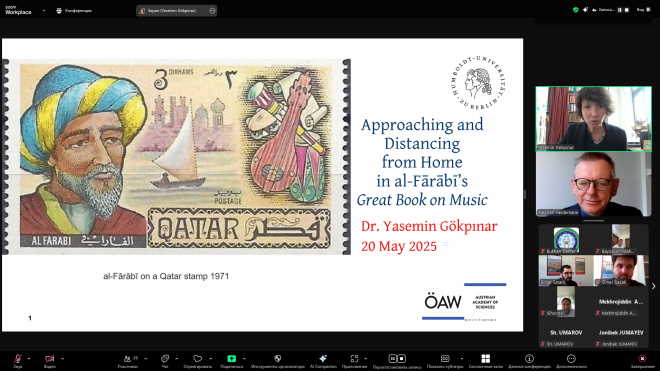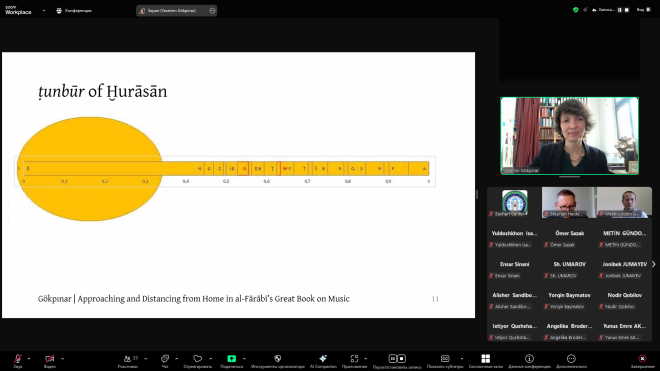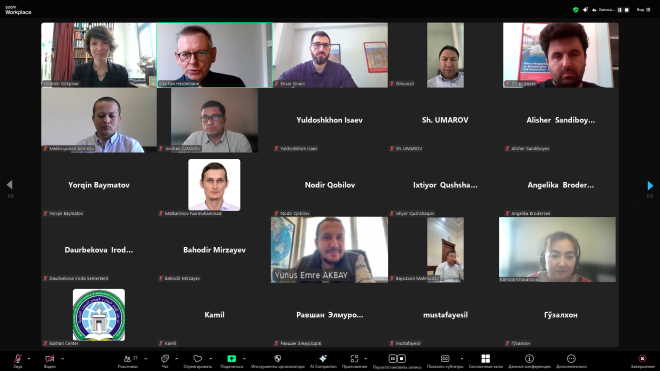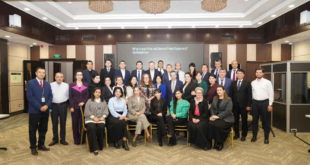An online seminar was recently held at the Imam Bukhari International Scientific Research Center in collaboration with the Institute of Asian and African Studies at the University of Hamburg, Germany, as part of the series titled “Cultural Treasures of the Zarafshan Valley.” The seminar was attended by staff of the Center, researchers from academic institutions in Uzbekistan and abroad, as well as scholars from Germany, Turkey and the United States.
During the event, Professor Dr. Yasemin Gökpınar from Humboldt University of Berlin delivered a lecture titled “The Principles of Approaching and Distancing from the Homeland in al-Farabi’s ‘The Great Book on Music.’”

The scholar analyzed the renowned thinker and philosopher Abu Nasr al-Farabi’s work “The Great Book on Music” not only as a theoretical source, but also as a symbolic reflection of the author’s personal origins, geographical roots and intellectual distances.
“In this work, al-Farabi not only elaborates on the theoretical foundations of music, but also seeks spiritual closeness to the homeland through musical instruments,” stated Dr. Gökpınar.

According to her, in certain parts of the book, al-Farabi deliberately distances himself from Greek sources and turns instead to local, that is, Central Asian elements. Through this, he may have sought to establish a spiritual connection with his homeland via the theory of music.
One of the aspects that particularly captured the participants’ attention was the analysis of traditional musical instruments such as the tanbur and shahrud, which are distinctive to the culture of the region’s peoples. The work gives significant attention to the shahrud, an instrument invented by the Sogdians, emphasizing its spread in Baghdad, the Levant and Egypt, as well as its role in expressing scientific concepts – this was interpreted as an important indication of al-Farabi’s profound respect and reverence for his native culture.
Dr. Gökpınar also noted that certain parts of al-Farabi’s work reveal an intellectual distance from Arab rulers, perhaps reflecting his sense of belonging to a different cultural identity.
“He did not see himself as affiliated with or subordinate to the ruling class, but rather as a scholar devoted to excellence and knowledge,” she emphasized.
The lecture also explored the Greek-Arabic translation traditions between the Greek and Islamic worlds, the cosmopolitan spirit of Baghdad (a setting where people of different nations, cultures, languages, and religions coexisted peacefully in a tolerant and diverse environment), and the practical applications of music theory.
The lecture concluded with the following message: “The Great Book on Music” is not merely a theoretical treatise. It is an intellectual journey, an inner return to the homeland, a spiritual quest, and a reflection of self-discovery. Al-Farabi invites us to experience music not only with the mind, but also with the heart and soul.

Participants highly praised the lecture as a scholarly analysis that harmonized modern science and cultural heritage.
The seminar continued with an engaging Q&A session.
 Imom Buxoriy xalqaro ilmiy-tadqiqot markazi bukhari.uz
Imom Buxoriy xalqaro ilmiy-tadqiqot markazi bukhari.uz





